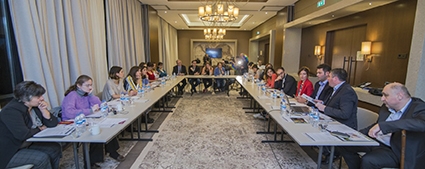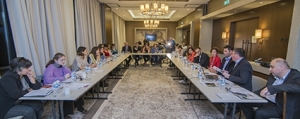On ENPARD, LEADER, LAGS and Minor Conundrums
By Vazha Tavberidze & Inga Mumladze
Embarking on yet another of media tours organized by ENPARD (For dummies: European Neighbourhood Programme for Agricultural and Rural Development), we (that is, me and my partner in crime, who gracefully opted for providing her opinions in Georgian) already had a more than vague idea what it would be about: another regional programme, where EU and its implementing partners here in Georgia (Mercy Corps, Care and People In Need) are trying to convince the locals that organized production and value chains present, in fact, better option (at least in long-term) than sporadically sending whatever goods they can muster to whoever is willing to buy them. As we Georgians are not exactly fond of this kind of caretaking (unless its forcefully imposed, whereupon we are besides ourselves with sheer joy and consequently, suffer from severe nostalgia over “ole good Soviet times”), one can say it is an arduous task, as it always is with changing people’s mentality.

This time it wasn’t potatoes – instead, we went to the beautiful Borjomi valley and its surroundings, where, unlike the region of Akhaltsikhe, the possibilities for both tourism and agricultural development are abundant. The famed Borjomi water, so sought-after in Soviet times, still boasts a host of suitors, especially those coming from post-Soviet states, with Central Asian countries being chief contributors. This explains the presence of two of the larger hotel brands in the region (Rixos (which, to our surprise, appears to be partially state-owned) and Crowne Plaza. Courtesy of our hosts from ENPARD, we had the luxury to visit both and even had a very enlightening chat with the RIXOS general manager, Mr. Shalva Alaverdashvili, who was kind enough to explain to us the dynamics and tourism potential of the valley through the prism of the hotel industry.
First came the seminar, dedicated to the work carried out by the three project implementing partners of ENPARD – “Mercy Corps” (Borjomi), “Care” (Lagodekhi) and “People in Need” (Kazbegi). And before we go into what the presentations were about, it needs to be said that ENPARD is expanding the scope of the programme (or, more correctly, it is entering its second stage), which means that additional five regions will be given the similar treatment. That’s how cool they are.
The major topic of the presentations were the so-called LEADER mechanism and the creation of Local Action Groups (LAG-s). To put it simply, the EU thinks that the inhabitants of this or that region know best what’s good for them and which direction they should be going (of course, the path should be that of European kind), so it encourages the creation of local action groups, helps them devise an agenda or a mandate of sorts and finally, assists them in implementation of said agenda. A LAG, in principle should incorporate representatives of civil society, private sector and governing bodies, with an apparent balance that favors no side. The LAGs we were told about ranged mostly from 15 to 30 people, with a quite intricate system of nomination and functionality in some cases. Pulling off a trick like this requires that an above average sense of social responsibility is present in said community, of which we were somewhat skeptical at first, but the Borjomi LAG did their very best to allay our suspicions. Not only did these people look very much driven and willing to do what it takes to see their region moving forward, but there were couple of ideas worthy of a seasoned entrepreneur of highest caliber. Equally apparent was also the massive amount of work the Mercy Corps has been doing there – the creation of LAG is one thing, but maintenance – ensuring that these people remain invested in the endeavor to the extent we saw – surely would have required a colossal amount of work on their part. On the project ideas mentioned above, here is the probably the simplest one: we met a very charming fellow, a local historian and photography aficionado, who takes simply sublime photo’s of let’s call it, “what’s there to see in Borjomi valley” and wants to distribute it to popularize the region. The quality of shots is top-notch, the artistic side is apparent for all to see and the effort he’s put into all of this is just incredible. Apparently, people at ENPARD thought just that and helped him obtain professional camera – the subsequent production will be turned into postcards to visualize the beauty of Borjomi for the first-comers. Simple, but very effective.
The second day was the day of trips. First in queue was the cooperative “Kenkra” (Berries), which, as the name suggest, deals in field of… well, berries – strawberries, raspberries, you name it. Now a couple of words about cooperatives in general – unlike those that were forcefully imposed upon people during Soviet times, the cooperatives of today are voluntary and therein lies their existential problem – well, not many want to join/pay, instead opting for a solo run. Very few Georgian cooperatives are achieving a phase where they can sustain themselves economically, without the support of government or international grants or donations. Despite all that, that’s still the way to go if Georgia wants to have European-styled chain agricultural production, according to Alvaro Ortega, ENPARD’s chief consultant, who was kind enough to sit down with us for an in-depth interview (to be published in GT’s next issue). This particular cooperative had a nicely gender-balanced composition (unlike what we saw in Akhaltsikhe) – 7 women and 6 men. Oh, and a very important detail – its all bio-organic, free of pesticides. There’s a niche for that kind of product in EU, we were told, and it indeed seems logical that a country like Georgia which cannot produce large volumes, would go for such trope. “Kenkra” also has a greenhouse production where they grow vegetables, tomatoes, cucumbers, greens, salads and are actively involved in in cattle-breeding, rabbit farming and collect food for cattle. The ENPARD is paying back their good faith with a sum of GEL 22,500, with which the cooperative will purchase a tractor and start a construction of additional greenhouse.
Next stop was at cooperative “Tori” which aims at developing the beekeeping sphere and enlargement of their production in the field. The 7 men cooperative boasts about 75 beehives and they are thinking of adding to this tally in the immediate future- with the support of the EU grant (GEL 50,000), Tori plans to purchase 150 beehives. And they aren’t allowing themselves to get rusty with the manufacturing either: apparently, two of those beehives will be modernized, high-tech platforms and beekeeping equipment. The resulting honey will be A) also bioorganic and B) sold at affordable prices locally. Of particular interest to tourists should be the Georgian Gray Bee bread, named Rukhi, which we didn’t get to taste (no season for it), but were assured was particularly delicious.

The last stop had a fair shot at adventure, with an offer of rafting tour incorporated in the agenda, but the weather made sure we weren’t going to be foolish enough. The rafting club “Jomardia” (Rafting in Georgian) was founded by TV personality and all-around athlete David Katsarava in 2007 and has risen to a status of major touristic attraction since. The fame of Borjomi rafting club has grown so much that the 2016 European cup tournament in rafting chose the place as its main avenue. Impeccably organized, the event was rated highly by the European partners and participants. The club has set its sights on expanding and ENPARD is helping it out with a solid funding of Gel 56, 820. We were pleased to hear that the founder of the Club, David Katsarava is getting ready for hosting the European Championship in Rafting for the summer of 2017 in Borjomi.

To all things an end, eventually and this trip was no exception. On our way home, we mused about what the ENPARD could have done better and the common consensus was – Not much. One sure hopes they keep up the good word and serve as an inspiration for our people to safely travel on an European path, we so firmly have set our feet on.











